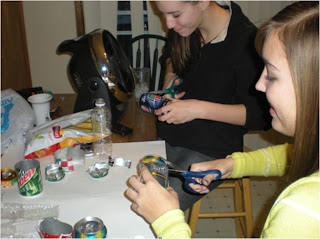Spotlight on Ninth Grade, Northwest Region, First Place Team: Team SWOOSH
Four ninth graders from Central Valley High School in Spokane Valley, Wash., received a first-place award in this year’s national eCYBERMISSION competition. With this award, each team member will receive a $3,000 U.S. EE Savings Bond, a certificate of recognition from the U.S. Army, and a free trip to the National Judging and Education Event (NJ&EE) in Baltimore, Md., in June to present their final projects.
“Team SWOOSH”, comprised of students Taylor Butters, Aidan Dowling, Kathryn Weisbeck and Carly Wolf, and led by Team Advisor Lori Buratto, researched home energy consumption in its community and investigated its ability to create windmills that would decrease energy bills and benefit the environment. The students felt that such an invention could decrease the amount of carbon dioxide (CO2) produced in homes and schools, subsequently reducing the effects of global warming.
The team conducted three separate experiments to test their hypothesis. First, they placed a piece of aluminum, plastic, cardboard and card stock on a metal cookie sheet outside for 72 hours to test the durability of the materials. The team then constructed a number of 4 foot tall windmills, placing them in front of a fan running at a constant rate, and tested if the windmills would spin consistently.
The students were successful in making their wood-framed windmill design spin consistently. The team plans to connect a generator to the windmill to determine whether energy can be produced.
To view a full list of the 2009-2010 eCYBERMISSION regional winning teams, click here.
“Team SWOOSH”, comprised of students Taylor Butters, Aidan Dowling, Kathryn Weisbeck and Carly Wolf, and led by Team Advisor Lori Buratto, researched home energy consumption in its community and investigated its ability to create windmills that would decrease energy bills and benefit the environment. The students felt that such an invention could decrease the amount of carbon dioxide (CO2) produced in homes and schools, subsequently reducing the effects of global warming.
The team conducted three separate experiments to test their hypothesis. First, they placed a piece of aluminum, plastic, cardboard and card stock on a metal cookie sheet outside for 72 hours to test the durability of the materials. The team then constructed a number of 4 foot tall windmills, placing them in front of a fan running at a constant rate, and tested if the windmills would spin consistently.
The students were successful in making their wood-framed windmill design spin consistently. The team plans to connect a generator to the windmill to determine whether energy can be produced.
To view a full list of the 2009-2010 eCYBERMISSION regional winning teams, click here.




Comments
Post a Comment
We welcome your comments and expect that our conversation will follow the general rules of respectful civil discourse. This is a moderated blog, and we will only post comments from bloggers over 13 years of age that relate to eCYBERMISSION. We will review comments for posting within one business day. Bloggers are fully responsible for everything that they submit in their comments, and all posted comments are in the public domain. We do not discriminate against any views, but we reserve the right not to post comments.